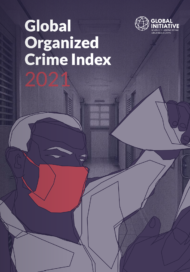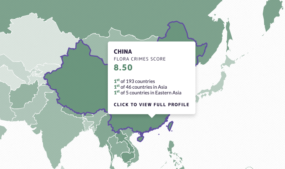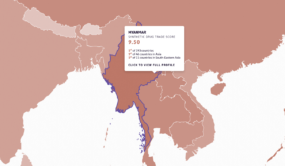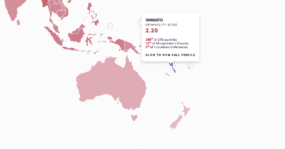Posted on 28 Jul 2023
According to the 2021 Global Organized Crime Index, Oceania has among the highest regional levels of resilience to organized crime in the world. However, once Australia and New Zealand are removed from the equation, the Index’s findings show that resilience in the Pacific Island countries (which form 12 of the 14 countries that make up the continent) is, at best, moderately effective.
The Index uses 12 indicators as the building blocks of the resilience wall that shields countries from the damaging effects of criminal markets and actors. These range from political leadership and territorial integrity to international cooperation and national policies. In the Pacific Island countries, one indicator that stands out is ‘victim and witness support’, which has the lowest score of all, averaging 3.67 out of 10.
At the other end of the resilience spectrum, ‘non-state actors’ is the second highest scoring indicator in the region – with a score of 5.38. Could there be a way to capitalize on the work of non-state actors to strengthen mechanisms, programmes and resource allocation for victims and witnesses of organized crime?
Civil society and victim support
In most Pacific Island countries, support for victims of trafficking and abuse, and for drug users is very limited. Apart from a few exceptions involving government-led initiatives – such as some shelters for abused children in Fiji or the provision of free legal advice and support for trafficking victims in the Marshall Islands – most efforts are led by local and international civil society groups, including NGOs and faith-based organizations.
In 2018, Vanuatu uncovered its largest human trafficking case to date, when local authorities identified 101 Bangladeshi nationals as trafficking victims. The victims had been trafficked to the Melanesian country by a Vanuatu-based Bangladeshi businessman (who was eventually convicted in 2022) with false promises of employment and passage to Australia, Cuba or New Caledonia. Instead, they were subjected to forced labour in construction and domestic work, kept in overcrowded conditions without water or electricity, and beaten and abused. Once rescued – thanks to one of the men, who managed to escape and raise the alarm – Vanuatuan civil society organizations stepped in to provide humanitarian assistance, while the governments of Australia and New Zealand helped with food and shelter.
In the Solomon Islands, foreign-funded NGOs such as Child Fund provide counselling for victims of domestic violence, abuse and bullying. They are also setting up referral systems to facilitate reporting crimes. Churches also play a substantial role in supporting victims, especially women and children, but also in educating men and youth to prevent them from turning to crime.
In Fiji, NGOs such as Empower Pacific and Medical Services Pacific provide counselling (including through a 24/7 helpline) and medical support to victims, particularly of trafficking, gender-based violence and child abuse, as well as counselling to Fijians deported from overseas (usually Australia, New Zealand or the US). Similarly, in Palau, the Red Cross, which supports a multi-agency anti- trafficking unit, provides food, shelter and psychological first aid to victims of trafficking and gender-based violence.
Challenges for civil society groups
These are just a few examples of the crucial services provided by non-state actors, which in some countries are the only support networks available for victims. Their relationship with government agencies varies considerably. Some NGOs are part of government-led task forces, such as the Red Cross in Palau, and others may have an agreement with government and assist the police. However, there are contexts where NGOs, especially if they are foreign-funded, are kept at arm’s length and viewed with suspicion, resulting in reluctance on the part of governments to share information and include them in consultations, and even threats to withdraw support for their work.
In addition to these challenges, local NGOs have red-flagged the impact of dwindling resources, particularly since the COVID-19 pandemic, which has threatened the existence of helplines and other services, and lack of technical expertise. One organization in Fiji was forced to rely on short-term volunteers from abroad, such as specialist child psychologists, resulting in gaps in the services available to victims.
The way forward
Despite these constraints, countries in the region have active civil society organizations that cooperate across borders as members of the Pacific Islands Association of NGOs and through other alliances. Pacific Island countries are home to a number of NGOs that are determined to assist victims and other vulnerable people, including by extending their efforts to rural communities and remote islands. As independent entities, they are often best placed to interact with victims who feel more comfortable sharing their experiences.
Given their existing work, experience and access to communities – and considering the poor track record of government actors in providing victim support initiatives and their broader capacity issues – there is a case for civil society to take the lead in designing and implementing victim support programmes. For these efforts to be actionable and sustainable, they need to be adequately resourced. This can be achieved through a combination of continued foreign support, but also through a rethinking of the allocation of financial and other resources, such as shelter facilities, by local governments. In addition, NGOs would benefit from stronger partnerships with government actors through greater and more transparent information sharing, so that they are able to intervene quickly when victims are identified.
This analysis is part of the GI-TOC’s series of articles delving into the results of the Global Organized Crime Index 2021. The series explores the Index’s findings and their effects on policymaking, anti-organized crime measures and analyses from a thematic or regional perspective



